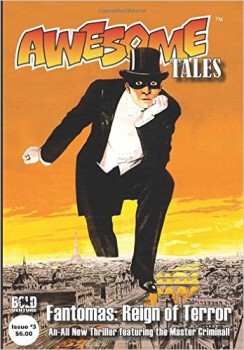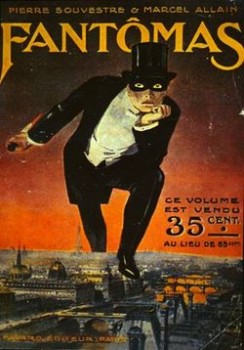Life During Wartime for Revived Pulp Characters

 Bold Venture Press and Black Cat Media recently unveiled a new pulp anthology title, Awesome Tales. Largely the brainchild of editor/lead writer R. Allen Leider, three issues have been published thus far. Leider’s featured stories in each have successfully revived vintage pulp characters and placed them in World War II settings.
Bold Venture Press and Black Cat Media recently unveiled a new pulp anthology title, Awesome Tales. Largely the brainchild of editor/lead writer R. Allen Leider, three issues have been published thus far. Leider’s featured stories in each have successfully revived vintage pulp characters and placed them in World War II settings.
The first issue featured The Domino Lady, a racy adventuress from the “spicies” who has found popularity with “new pulp” specialty publishers such as Moonstone Books and Airship 27. Leider, who operates Black Cat Media, collaborated with Rich Harvey, who operates Bold Venture Press with Audrey Parente, in penning this new adventure that advances the character from her 1930s origins to the Second World War. Interestingly, the entire Domino Lady revival began when Bold Venture Press collected the character’s original 1930s adventures in 2004 and set the stage for new adventures to follow.
Awesome Tales #2 boasts another World War II story from Leider, “Der Fuhrer Mabuse.” This rather brief tale sees the return of Inspector Lohmann, the protagonist from Fritz Lang’s chilling crime drama, M (1931) and Lang’s The Testament of Dr. Mabuse, the 1933 sequel to his 1922 silent epic, Dr. Mabuse the Gambler. Mabuse is a classic character from European pulp fiction and cinema who has had a small, but dedicated cult following in the United States for decades. While Norbert Jacques’ original 1921 novel portrayed him as a psychologist/hypnotist and criminal mastermind in the vein of Professor Moriarty who literally falls from the great heights he climbed, Lang’s 5 hour silent film epic sees the character driven insane when he stretches his reach too far and his criminal empire collapses.
Both book and film use State Prosecutor Von Wenk as the protagonist who relentlessly pursues Mabuse to the bitter end. Lang’s decision to have portly, idiosyncratic Otto Wernicke reprise the role of Inspector Karl Lohmann from M as a substitute for Von Wenk proved to be brilliant. Likewise, the inspired decision to have Mabuse remain in a catatonic coma in the sequel while his analyst’s obsession with his infamous patient leads to a form of psychic transference upon the criminal mastermind’s death. Lang and his wife and screenwriter Thea Von Harbou’s decision to emphasize the occult aspects of the character helped make the sequel a noir classic and sets the stage for what Leider does with the material here.
It should be noted this is more of a variation than a direct sequel. Leider’s version establishes Mabuse as a mental patient during the Second World War (think Thomas Harris’ Silence of the Lambs) that Lohmann (rather than Von Wenk) had successfully arrested in the early 1920s. Leider has also extended Mabuse’s reach from the sanitarium to controlling Adolf Hitler as his puppet dictator. This makes for a nice extrapolation of Fritz Lang’s somewhat disingenuous claims The Testament of Dr. Mabuse was intended as an anti-Nazi diatribe. Lang, a Jew, fled Germany for the United States after completing the picture. His screenwriter and wife, Thea Von Harbou stayed behind as a member of the Nazi Party. Leider has a good and entertaining story, but it is all too brief and really cries out for novel-length expansion to fully realize the concept’s potential.

 Awesome Tales#3 leads off with Leider’s third consecutive Second World War tale, “Fantomas: Reign of Terror.” Fantomas was the absurdist serial killer anti-hero of French pulp tales by the writing team of Pierre Souvestre and Marcel Allain. The duo penned 32 novels (yes, full-length novels) chronicling his exploits over the course of just two years (1911 – 1913). After Souvestre’s death, Allain married his partner’s widow and continued the series on his own adding an additional 11 titles beginning in 1925 and ending in 1963.
Awesome Tales#3 leads off with Leider’s third consecutive Second World War tale, “Fantomas: Reign of Terror.” Fantomas was the absurdist serial killer anti-hero of French pulp tales by the writing team of Pierre Souvestre and Marcel Allain. The duo penned 32 novels (yes, full-length novels) chronicling his exploits over the course of just two years (1911 – 1913). After Souvestre’s death, Allain married his partner’s widow and continued the series on his own adding an additional 11 titles beginning in 1925 and ending in 1963.
Leider’s story sees the stalwart Inspector Juve (whose all-encompassing obsession with Fantomas often leads the reader and other characters to suspect they are one and the same person) offers Fantomas clemency in exchange to his leading the Resistance movement against the occupying Nazi forces. The author has Fantomas’ sense of outrageous black humor down well, particularly the crucifixion sequence and the fates reserved for the Nazi censors appointed to control the media, but the absurdist nature is lacking. This may be deliberate for, as with the Mabuse story, the tone seems to fit with Thomas Harris’ darkly comical and twisted novels of Hannibal Lecter rather than the sometimes campy, but still disturbing tone of the originals. Leider also captures the tension between Juve and his young sidekick, newspaper reporter Fandor caused by the young man’s affair with Helene, the daughter of Fantomas. This is a much more satisfying read than the brief Mabuse story the previous issue.
One legitimate complaint is the author’s fondness for seemingly anachronistic phrases such as “weapons of mass destruction,” “going over to the Dark Side,” and “collateral damage.” These stylistic quibbles, along with the odd typos that slip through, are minor compared to all that is positive. One cannot hope helping the author expands the narrative into a novel, perhaps weaving all three stories into one tapestry. Thus far, I have said nothing about the back-up features or illustrations in each issue. Both aspects brought fond recollections of the Marvel Magazines line of the 1970s and 1980s with their occasional supporting text pieces and sometimes provocative (for those accustomed to the Comics Code Authority) black and white illustrations. Awesome Tales looks to be a winner in the burgeoning “new pulp” field and a rarity in the publishing world that the title can live up to the hyperbole. Well done, all around.
William Patrick Maynard was licensed by the Sax Rohmer Literary Estate to continue the Fu Manchu thrillers beginning with The Terror of Fu Manchu (2009; Black Coat Press) and The Destiny of Fu Manchu (2012; Black Coat Press). The Triumph of Fu Manchu is coming soon from Black Coat Press.